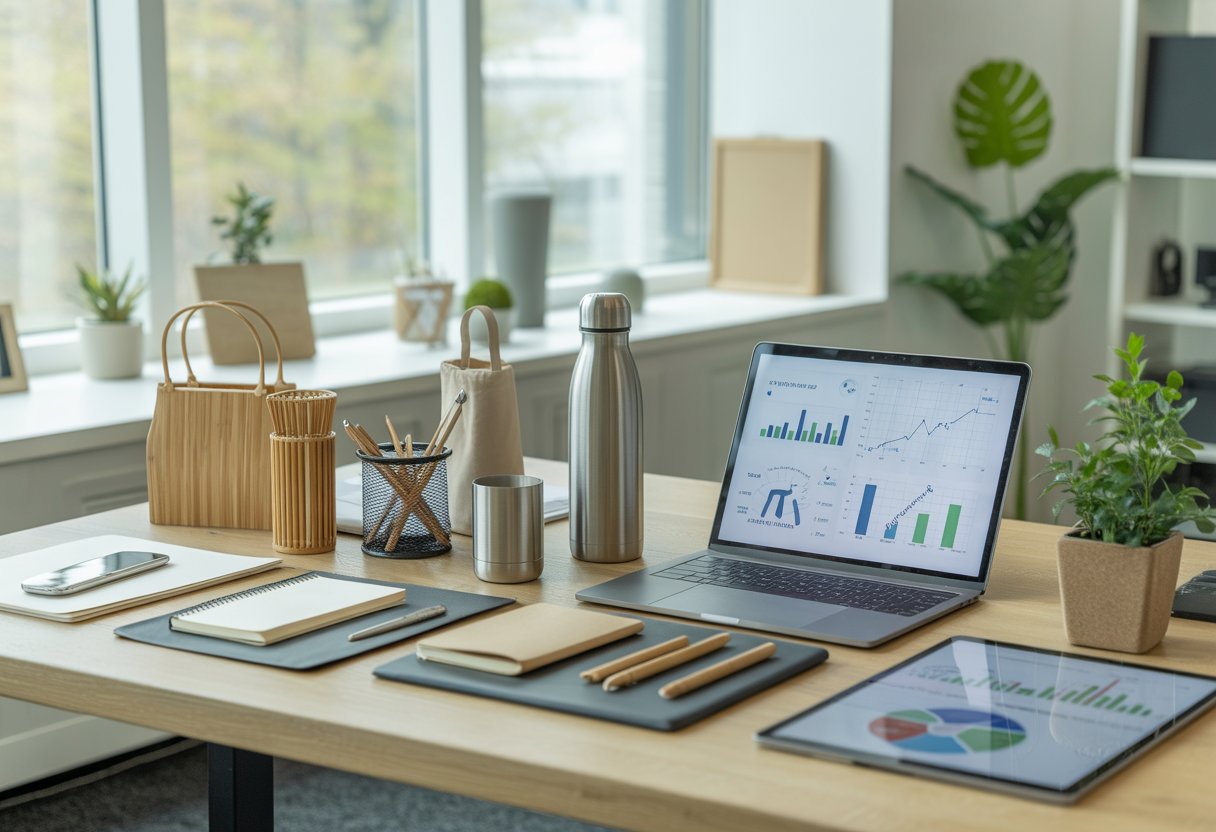The promotional products industry stands at a turning point as companies rethink how they connect with customers. What worked five years ago may not work today, and businesses must adapt to changing consumer values and new technology.

The future of promotional products will be shaped by sustainability demands, smart technology integration, personalised experiences, and a focus on items that truly improve people’s daily lives. Companies are moving away from cheap, throwaway items toward products that customers actually want to keep and use.
Three major forces are driving these changes: environmental awareness, digital innovation, and the shift to remote work. Customers now expect brands to offer eco-friendly options, tech-savvy products, and items that fit their wellness goals. Understanding these trends will help businesses choose promotional products that build stronger customer relationships and deliver better returns on marketing investment.
Key Industry Trends Shaping the Future

Three major forces are transforming promotional products: companies are prioritising eco-friendly materials and production methods, integrating smart technology into traditional items, and creating highly customised experiences for individual recipients.
Sustainability as a Driving Force
Environmental awareness has shifted from trend to requirement in promotional products. Companies now face pressure from consumers and stakeholders to choose eco-friendly options.
Sustainable materials are replacing traditional plastics and synthetic fabrics. Bamboo, recycled ocean plastic, and organic cotton have become standard choices for promotional items.
Carbon-neutral production methods are gaining traction. Manufacturers are adopting renewable energy sources and offsetting emissions from shipping and production processes.
Key sustainable product categories include:
- Reusable water bottles made from recycled materials
- Biodegradable phone cases
- Solar-powered portable chargers
- Organic cotton tote bags
Circular economy principles are influencing design decisions. Products are now created with end-of-life recycling in mind, ensuring materials can be repurposed rather than discarded.
Companies report that sustainable promotional products generate higher brand loyalty amongst environmentally conscious consumers. This shift reflects broader changes in marketing strategies that align with consumer values.
Integration of Technology
Smart technology is transforming basic promotional items into functional digital tools. Traditional products now feature embedded sensors, connectivity, and interactive capabilities.
Wearable technology leads this transformation. Smart fitness trackers, health-monitoring wristbands, and Bluetooth-enabled accessories serve dual purposes as promotional items and useful tools.
Artificial intelligence integration allows products to personalise user experiences. Smart speakers with custom branding can learn user preferences and provide tailored responses.
Popular tech-integrated promotional items:
- Wireless charging pads with company logos
- Bluetooth speakers with custom sound profiles
- Smart water bottles that track hydration
- Digital business cards with NFC technology
Near-field communication (NFC) chips are being embedded in traditional items like keychains and badges. These create instant digital connections between products and mobile devices.
Personalisation and Customisation
Advanced printing and manufacturing technologies enable unprecedented levels of personalisation. Companies can now create unique items for individual recipients rather than mass-produced identical products.
Variable data printing allows different names, messages, or designs on each item within the same production run. This technology makes small-batch customisation economically viable.
Digital customisation platforms let recipients personalise their own promotional products. Users can choose colours, add personal text, or upload images before items are manufactured.
Customisation options now include:
- Individual colour preferences
- Personal names or initials
- Custom sizing for apparel
- Location-specific designs
Machine learning algorithms analyse recipient data to suggest optimal product choices and customisation options. This data-driven approach improves gift relevance and recipient satisfaction.
On-demand manufacturing reduces waste whilst enabling personalisation. Products are created only after orders are placed, eliminating excess inventory and allowing for individual modifications.
Sustainability and Eco-Friendly Innovations

Companies now prioritise sustainable promotional products as customer expectations shift towards environmental responsibility. Eco-friendly materials are replacing traditional options whilst businesses seek items that demonstrate genuine environmental commitment.
Emergence of Eco-Friendly Materials
Recycled plastics have become a leading choice for promotional items. Manufacturers create bottles, bags, and tech accessories from ocean waste and post-consumer materials.
Bamboo stands out as a rapidly renewable resource. This material grows without pesticides and regenerates quickly after harvesting.
Organic cotton replaces conventional cotton in apparel and bags. It uses 88% less water and eliminates harmful chemicals from production.
Cork offers waterproof and lightweight properties. Companies use it for keychains, coasters, and phone cases.
Wheat straw provides an alternative to plastic. This agricultural byproduct creates durable pens, lunch boxes, and drinkware.
Key sustainable materials include:
- Recycled ocean plastic
- FSC-certified wood
- Hemp fibres
- Recycled aluminium
- Plant-based bioplastics
Popular Sustainable Product Options
Bamboo utensils rank among the most requested eco-friendly promotional items. These reusable sets replace single-use plastic cutlery and appeal to environmentally conscious consumers.
Engraved water bottles made from stainless steel or recycled materials encourage hydration whilst reducing plastic waste. Companies often choose these for their durability and daily use potential.
Seed paper products grow into plants after use. Business cards, bookmarks, and notebooks made from this material create lasting impressions.
Solar-powered chargers combine technology with sustainability. These devices reduce reliance on traditional electricity sources.
Tote bags from recycled materials serve multiple purposes. Companies favour them for their practicality and visible branding opportunities.
Corporate Social Responsibility and Environmental Impact
Businesses integrate promotional products into broader sustainability strategies. These items demonstrate environmental commitment to stakeholders and customers.
Transparency drives purchasing decisions. Companies seek suppliers who provide clear information about materials, production methods, and environmental certifications.
Measurable impact helps organisations track progress. Many suppliers now offer carbon footprint calculations and recycling program partnerships.
Employee engagement increases when companies choose sustainable options. Staff members often appreciate working for environmentally responsible employers.
Customer loyalty strengthens through consistent environmental messaging. Promotional products that align with company values create authentic brand experiences.
Technological Advancements in Promotional Products
Technology is transforming promotional products into interactive marketing tools that connect brands with customers in new ways. Smart devices, wireless charging solutions, and portable power accessories are leading this digital revolution in corporate gifting.
Smart and Connected Devices
Bluetooth speakers have become one of the most popular tech promotional products. These devices offer practical value whilst keeping brand visibility high through daily use.
Companies can customise speakers with logos, colours, and even branded audio messages. Many models feature LED lights that can display company colours or flash in patterns.
Smart home devices like voice assistants are entering the promotional space. Branded smart plugs and temperature sensors give recipients useful technology whilst promoting the company.
Key features driving adoption:
- Voice activation capabilities
- Mobile app integration
- Multi-device connectivity
- Custom branding options
Wearable technology presents new opportunities for promotional campaigns. Fitness trackers and smartwatches can display company logos on screens and bands.
These connected devices create ongoing engagement. Recipients interact with the brand each time they use the product, extending marketing impact beyond traditional promotional items.
Wireless Charging Solutions
Wireless chargers have revolutionised promotional products by combining practicality with modern technology. These devices eliminate the need for cables whilst providing consistent brand exposure on desks and bedside tables.
Promotional wireless chargers come in various forms. Desktop pads offer large branding areas perfect for company logos. Wireless charging stands position phones at ideal viewing angles for video calls.
Fast-charging technology has improved significantly. Many promotional wireless chargers now support 15W fast charging for compatible devices.
Popular wireless charging formats include:
- Charging pads for desks
- Car wireless chargers
- Multi-device charging stations
- Furniture with built-in charging
Companies appreciate these products because recipients use them daily. Every time someone charges their phone, they see the brand logo and remember the company.
The technology works with most modern smartphones. This broad compatibility makes wireless chargers practical gifts for diverse audiences.
Portable Power Accessories
Power banks remain essential promotional products as mobile device usage continues growing. Modern promotional power banks offer higher capacities and faster charging speeds than earlier models.
Solar-powered chargers appeal to environmentally conscious recipients. These devices combine sustainability with practicality, aligning with corporate responsibility goals.
Multi-port power banks can charge several devices simultaneously. This feature makes them valuable for business travellers and busy professionals.
Advanced features in promotional power banks:
- Digital capacity displays
- USB-C fast charging
- Wireless charging surfaces
- Built-in cables
Compact designs fit easily in pockets and bags. Slim power banks with credit card form factors provide portability without bulk.
Custom branding options include full-colour printing, engraving, and LED logos. Some power banks feature screens that can display branded messages or company information.
Safety certifications ensure promotional power banks meet international standards. Quality products protect recipients’ devices whilst maintaining positive brand associations.
Personalisation, Customisation, and Hyper-Targeted Marketing
Modern promotional products are moving towards individualised customer experiences through advanced data analytics and AI-powered customisation technologies. Companies can now create highly targeted campaigns that deliver personalised items based on specific customer preferences and behaviours.
Personalised Promotional Products
Personalised promotional products represent the evolution from basic branded merchandise to individually tailored items. Companies now create unique products for each recipient based on their interests, purchase history, and demographic data.
Popular personalised items include:
- Engraved water bottles with custom names and messages
- Branded notebooks with personalised covers
- Custom apparel sized to individual measurements
- Tech accessories with tailored functionality
Advanced printing technologies enable cost-effective personalisation at scale. Digital printing allows companies to produce small batches of customised items without significant setup costs.
Recipients show 73% higher engagement with personalised promotional products compared to generic items. This increased connection drives better brand recall and customer loyalty.
On-Demand Customisation
On-demand customisation allows customers to personalise promotional products in real-time through online platforms. This approach reduces inventory costs whilst increasing customer satisfaction.
Key technologies driving this trend:
- 3D printing for rapid prototyping and production
- Digital embroidery machines for textile customisation
- Laser engraving systems for precise personalisation
- Web-to-print platforms for customer design input
Customers can modify colours, add text, upload images, and adjust sizes before placing orders. This self-service approach speeds up the ordering process and reduces errors.
Companies benefit from reduced warehouse requirements and eliminated excess stock. Orders are fulfilled only after confirmation, minimising waste and storage costs.
Data-Driven Personalisation Strategies
Data analytics enable companies to create targeted promotional campaigns based on customer behaviour patterns. Advanced algorithms analyse purchase history, website interactions, and demographic information to predict preferences.
Effective data sources include:
- Customer relationship management systems
- Website analytics and browsing behaviour
- Social media engagement patterns
- Previous promotional product interactions
Companies segment audiences into specific groups based on shared characteristics. Each segment receives tailored promotional products that align with their identified preferences and needs.
AI-powered recommendation engines suggest optimal products for individual customers. These systems continuously learn from customer responses to improve future personalisation accuracy.
Privacy regulations require transparent data usage policies. Companies must obtain proper consent whilst maintaining customer trust through responsible data handling practices.
Wellness, Lifestyle, and Utility Trends
Companies are investing heavily in promotional products that support healthy lifestyles and daily routines. These items build stronger connections with customers by addressing real needs whilst promoting brand awareness.
Branded Wellness and Fitness Items
Wellness-focused promotional products have become essential tools for businesses targeting health-conscious consumers. Companies are moving beyond basic branded merchandise to offer functional fitness items that people actually use.
Branded yoga mats represent a significant opportunity in this space. These items provide extended brand exposure during regular exercise routines. The large surface area allows for creative branding whilst offering genuine value to recipients.
Engraved water bottles remain highly popular due to their practical nature and frequent use. Recipients carry these items throughout their day, creating consistent brand visibility. The personalisation element through engraving adds perceived value and encourages long-term retention.
Popular wellness promotional items include:
- Resistance bands with company logos
- Branded fitness trackers and step counters
- Customised gym towels
- Promotional protein shakers
- Branded meditation cushions
Functional, Everyday Product Choices
Businesses are prioritising promotional products that integrate seamlessly into daily routines. Recipients value items they can use regularly rather than novelty products that gather dust.
Multi-functional products deliver exceptional value for promotional budgets. A branded portable phone charger that doubles as a torch serves multiple purposes. Recipients appreciate the thoughtfulness behind practical gifts.
Common functional promotional items include:
- Wireless charging pads with company branding
- Reusable shopping bags
- Branded desk organisers
- Customised travel mugs with temperature control
- Promotional blue light blocking glasses
The focus on utility ensures promotional products remain visible in recipients’ daily lives. This consistent exposure strengthens brand recall and builds positive associations with the company.
Promotional Products for Lifestyle Integration
Modern promotional products must align with recipients’ personal values and lifestyle choices. Companies are developing merchandise that reflects contemporary concerns about sustainability, wellness, and work-life balance.
Customer loyalty increases when promotional products demonstrate understanding of recipients’ priorities. Eco-friendly items appeal to environmentally conscious consumers. Tech-enabled products attract digital natives who value connectivity and convenience.
Lifestyle-integrated promotional products include:
- Bamboo desk accessories for eco-conscious professionals
- Branded essential oil diffusers for wellness enthusiasts
- Customised laptop sleeves for remote workers
- Promotional gardening kits for sustainability advocates
These products become part of recipients’ identity rather than simple advertising tools. They create emotional connections that traditional promotional items cannot achieve.
Evolving Marketing Strategies and Customer Loyalty
Marketing strategies now rely on data and technology to create stronger connections with customers. Companies use promotional products as part of bigger plans to build loyalty and meet changing customer needs.
Data-Driven Selection and Measurement
Modern marketing strategies use data to choose promotional products that work best. Companies track which items customers use most and how they affect brand awareness.
Smart businesses measure the success of promotional campaigns through digital tools. They look at website visits, social media mentions, and sales increases after giving out branded items.
Key measurement areas include:
- Customer engagement rates
- Return on investment for promotional campaigns
- Brand recall after receiving products
- Long-term customer behaviour changes
Data helps companies spend their marketing budget better. Instead of guessing what customers want, they use real information to pick products that create lasting connections.
Many businesses now track promotional products through QR codes or apps. This shows them exactly how customers interact with their branded items over time.
The Role of Promotional Products in Building Relationships
Promotional products help companies create stronger relationships with their customers. These items work as physical reminders of the brand that customers can touch and use daily.
Customer loyalty grows when people receive useful promotional products. A quality branded item makes customers feel valued and more likely to choose that company again.
Effective relationship-building approaches:
- Giving products that match customer interests
- Timing gifts with important customer moments
- Creating items that solve real problems
- Making products that start conversations
Companies find that promotional products work better than digital ads alone. The physical connection creates trust and positive feelings towards the brand.
Smart businesses use promotional products as part of customer loyalty programmes. They reward regular customers with special branded items that make them feel part of an exclusive group.
Adapting to Changing Consumer Expectations
Consumer expectations keep changing, and marketing strategies must keep up. Customers now want promotional products that match their values and lifestyle choices.
Environmental concerns shape what customers expect from promotional items. They prefer products made from sustainable materials that won’t harm the planet.
Current customer expectations include:
- Eco-friendly materials and production methods
- High-quality items that last for years
- Products that serve a real purpose
- Personalised items that feel special
Younger customers especially want brands to show social responsibility through their promotional products. They choose companies that align with their beliefs about the environment and society.
Marketing strategies now focus on creating emotional connections through promotional products. Companies that understand and meet these changing expectations build stronger customer loyalty and see better business results.



